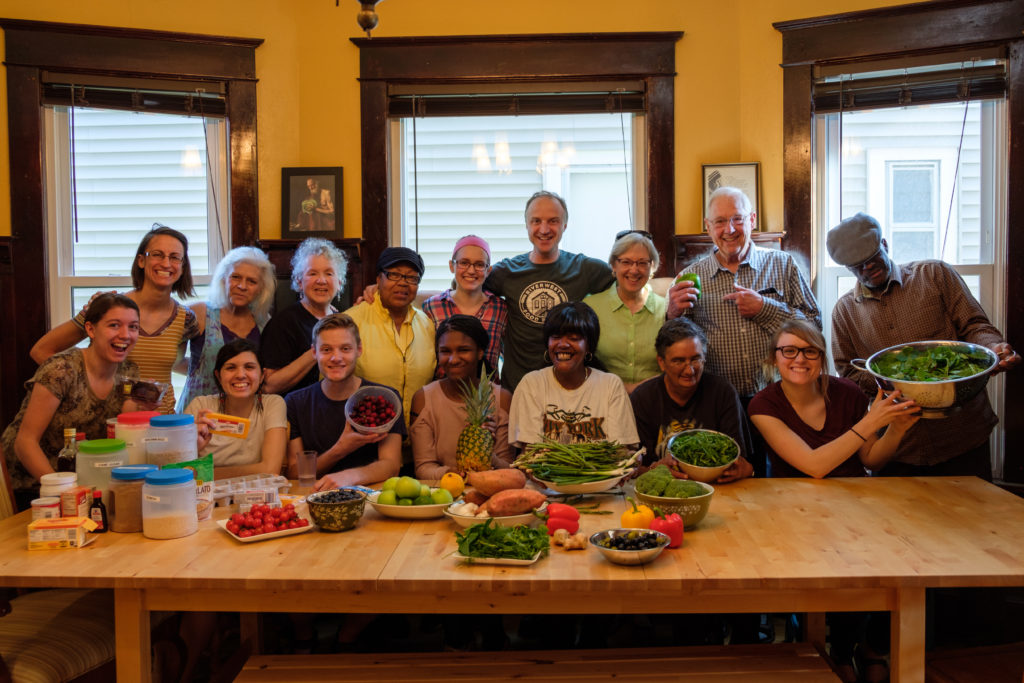Last year, I took on vegetables as my Lenten penance. Well, not just vegetables. Fruit, too – and lentils, and locally-sourced dairy products. “Get closer to your food,” was the motto I muttered to myself as I made my way sheepishly up and down the aisle of the neighborhood co-op, reorienting myself to an unfamiliar floor plan filled with unfamiliar labels.
It may seem that this was a somewhat bizarre way to keep the 40 days. But it was my attempt to shift my attitude from consumer to steward. Dr. Norman Wirzba described this dynamic in his Oct. 4, 2018, lecture on “The Spirituality of Eating” hosted by the Terrence J. Murphy Institute for Catholic Thought, Law and Public Policy, commenting that our culture is unusual in that we are the first to have a shopping relationship to food. This he called “the most naive relationship to food possible.” It was this naivete that I wished to cast off by making more intentional decisions about my groceries.

Sarah Spangenberg
And so, each Tuesday afternoon as I combed through local produce and compared the prices of dried beans, I welcomed God in and asked how my Catholic faith ought to impact my purchases. As I did, I discovered new space within me for the Holy Spirit to move. Real conversion happened at the co-op, as my own eating preferences came face to face with a more, let’s say, realistic pricing scheme for locally- and ethically-sourced meat, dairy and fresh produce. Newfound financial constraints (avocados now cost $2.15, not 89 cents) necessitated that I simplify my diet and be honest about what was really a need and what was just a like. Each trip to the store became a concrete way to exercise my own freedom with love and reverence for God and neighbor in mind.
Back at the house, the encounter continued, now fragrant with a new joy in God’s generosity. Bundles of leafy greens needed to be washed, cut and stored; carrots and beets awaited peeling; cream-top milk sat ready to be incubated into homemade yogurt. The post-grocery process was sometimes an hour of silently working in my kitchen, handling and admiring the food that I was to eat that week.
I was no longer throwing away wads of cellophane and plastic, nor was I discarding food, since it was practically all used, and every meal now involved the work of my own hands. The time investment helped me see the worth of small things.
The incarnational and sacramental nature of God’s love took on new contours in my daily life and formed new pathways to prayer in my heart. I recalled something a wise professor has pointed out to me on several occasions, that a Catholic home should be recognizable not only by religious paraphernalia, but also by what’s on the table.
In our culture, it seems that food is becoming more and more a matter of individual control. Preferences and dietary habits are increasingly particular. Americans, especially singles, have an enormous amount of control over what food we eat and what food we avoid, and shared meals are so rare an occasion that we hardly ever have to accommodate. I observe from my own experience, and with no disrespect to anyone, that this can create a false sense of autonomy and self-sufficiency.
What I found is that inviting the Lord into my decisions about food reversed that paradigm of autonomy and reminded me of something very simple yet profound: Every single thing that makes its way to my plate has been willed into existence by God and its growth cultivated by His provision.
Those hours spent buying and preparing my weekly produce were a deep insight for what Wirzba said during his lecture: “Food is absolutely central to the movement of the life of faith.” Getting closer to my food was indeed a movement in my life of faith. It transformed something simple – my weekly trip to the grocery store – into a chance to love and serve God by using His gifts with responsibility and gratitude, and gave me a glimpse into what it means to have the heart of a steward.





